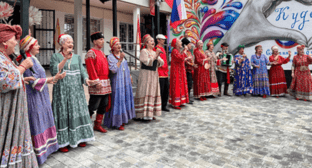25 May 2011, 22:40
AI's report concentrates on elimination of Five-Day War consequences
The 2010 report of the Amnesty International (AI) on Georgia for 2010 emphasizes the consequences of the military conflict in August 2008; violations of the rights of internally displaced persons (IDPs); actions of the police and security bodies; and violation of children's rights in refugees villages. The report was prepared within the general annual report on human rights situation in the world and was disseminated on May 12.
The most important Georgia's problem mentioned in the report concerns the consequences of the war in August 2008. The document states that "there is no essential progress in inquiry into violations of human rights and international humanitarian law, committed during the military conflict in August 2008, and in attraction of those guilty to responsibility."
The report makes reference to the document prepared by experts from the Commissariat for Human Rights of the Council of Europe, which points out "serious shortcomings" admitted by all the parties in conflict, when investigating the fates of the persons who had disappeared after the conflict. The report criticizes the obvious failure of Georgian authorities to conduct an effective inquiry into violations of the rights of three persons from South Ossetia, who disappeared in the Georgian-controlled territory in October 2008.
Besides, the report mentioned the release in March 2010 of six captives from Georgia and six captives from South Ossetia, who were held for almost two years in captivity.
The report also mentions the fact of beating of Timur Tskhovrebov, a local journalist and public activist, in the city of Tskhinvali on May 26, 2010. He was attacked by a group of 10 people who left Tskhovrebov without help with a knife wound in his neck, a broken finger and other injuries.
"Four days earlier, Boris Chochiev, a senior official of the de facto administration of South Ossetia, had treated the Georgian-Ossetian Civil Forum, which was held in the Netherlands and where Timur Tskhovrebov was present, to be harmful and treacherous to the interests of South Ossetia," the report says. Human rights activists state that by the end of 2010 the investigation into the attack on Tskhovrebov was not even started.
The report draws particular attention to continued detentions and arrests of civilians in the conflict zone for "illegal crossing" of the administrative border between Georgia and South Ossetia. At the same time, the report points out that "detention extensions were less frequent in the second half of 2010."
IDPs make the second pressing topic of the report. This section covers eviction of 500 refugees in June and July last year. "The process of eviction contradicts to international standards, and, in some cases, the government failed to provide the refugees with any alternative shelter or compensation," emphasizes the report. At the same time, the authors admit that the Georgian government had taken measures to improve the IDPs' living conditions by providing the poorest ones with poverty benefits and transferring real estates into refugees' ownership.
"However, some of the restored or newly built settlements fail to meet the standards of adequate accommodation because of lack of access to normal water, sanitation and other essentials. Integration of IDPs is poor, many of them face barriers in finding jobs, receiving medical services and social protection," the document says.
In the chapter "Police and Security Bodies" the authors refer to the report of the European Commission against Torture, which stated some progress in the investigation of ill-treatment of pre-trial detainees, "but there is a concern about the ill-treatment at arrest and in police stations".
The report also writes about the human rights organizations' protest regarding amendments to the Law "On Police" adopted on October 24, which now allow policemen to detain people on the streets, when they have "reasonable suspicions."
The following shortcomings in the police and security sphere were particularly stressed in the report: the government failed to conduct an effective investigation and trial on cases of the policemen who brutally beat demonstrators on May 6, 2010; no details of the police internal investigation regarding those policemen who beat people at dispersal of the rally on June 15, 2009, were ever published.
The report's last chapter focuses on abuses against women and children. It is stated only that first shelters for victims of family violence were established in Tbilisi and Gori. Besides, the parliament adopted the Law "On Gender Equality" directed against discrimination in employment, education, social services and family relations.
Author: Beslan Kmuzov Source: CK correspondent




